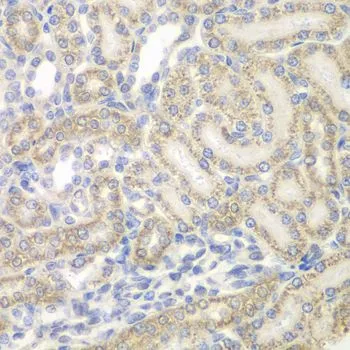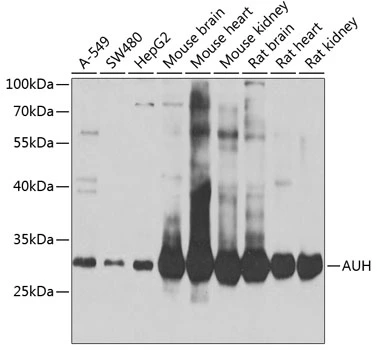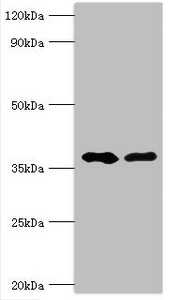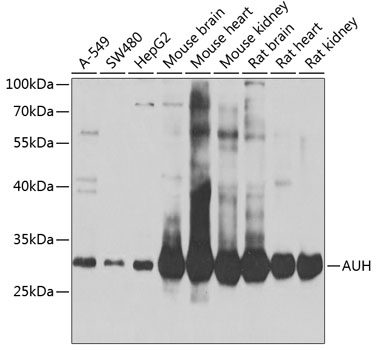
IHC-P analysis of rat kidney tissue using GTX55527 AUH antibody. Dilution : 1:100
AUH antibody
GTX55527
ApplicationsWestern Blot, ImmunoHistoChemistry, ImmunoHistoChemistry Paraffin
Product group Antibodies
ReactivityHuman, Mouse, Rat
TargetAUH
Overview
- SupplierGeneTex
- Product NameAUH antibody
- Delivery Days Customer9
- Application Supplier NoteWB: 1:500 - 1:2000. IHC-P: 1:50 - 1:200. *Optimal dilutions/concentrations should be determined by the researcher.Not tested in other applications.
- ApplicationsWestern Blot, ImmunoHistoChemistry, ImmunoHistoChemistry Paraffin
- CertificationResearch Use Only
- ClonalityPolyclonal
- ConjugateUnconjugated
- Gene ID549
- Target nameAUH
- Target descriptionAU RNA binding methylglutaconyl-CoA hydratase
- Target synonymsmethylglutaconyl-CoA hydratase, mitochondrial, 3-MG-CoA hydratase, 3-methylglutaconyl-CoA hydratase, AU RNA binding protein/enoyl-CoA hydratase, AU RNA-binding protein/enoyl-Coenzyme A hydratase, AU-binding protein/Enoyl-CoA hydratase, AU-specific RNA-binding enoyl-CoA hydratase, itaconyl-CoA hydratase
- HostRabbit
- IsotypeIgG
- Protein IDQ13825
- Protein NameMethylglutaconyl-CoA hydratase, mitochondrial
- Scientific DescriptionThis gene encodes bifunctional mitochondrial protein that has both RNA-binding and hydratase activities. The encoded protein is a methylglutaconyl-CoA hydratase that catalyzes the hydration of 3-methylglutaconyl-CoA to 3-hydroxy-3-methyl-glutaryl-CoA, a critical step in the leucine degradation pathway. This protein also binds AU-rich elements (AREs) found in the 3 UTRs of rapidly decaying mRNAs including c-fos, c-myc and granulocyte/ macrophage colony stimulating factor. ARE elements are involved in directing RNA to rapid degradation and deadenylation. This protein is localizes to the mitochondrial matrix and the inner mitochondrial membrane and may be involved in mitochondrial protein synthesis. Mutations in this gene are the cause of 3-methylglutaconic aciduria, type I. Alternative splicing results in multiple transcript variants. [provided by RefSeq, Sep 2015]
- ReactivityHuman, Mouse, Rat
- Storage Instruction-20°C or -80°C,2°C to 8°C
- UNSPSC41116161





